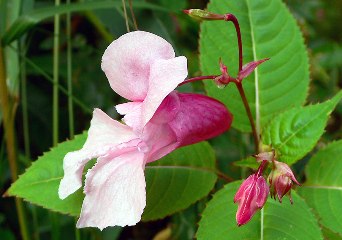Biodiversity
Related Links
Latest News
A Starring Role for Nantclwyd’s Lesser Horseshoe Bats
22.05.2015
Living Landscape Brought Back to Life
05.12.2014
Facebook Page
Himalayan balsam
Alyn Valley Himalayan Balsam Project
Himalayan balsam is an invasive non-native species. It is originally from the Himalayan region of Asia, but was brought to the UK in the 1800s as an ornamental plant and has since escaped into the countryside.

It is a tall plant, growing to two or even three metres high, and it produces pink, sweet-smelling flowers between June and October. Its success is partly due to the seedpods being able to shoot out the seeds to a distance of 7m. The seeds of this plant can survive and even begin to germinate under water, making the spread along river systems extremely rapid. They can easily compete against the native UK plants by shading them from the sun.
Project
The project to control Himalayan balsam in the Alyn valley started in 2008 and work to remove the species has happened every year since. Some areas of the river catchment which were once a sea of pink have no balsam at all, and overall it is much reduced in the project area. One key factor in the project’s success has been the systematic approach of starting in the upper reaches of the river and working downstream, thereby eliminating the source of balsam seeds up-river which could cause re-infestation. The second factor has been the involvement of committed volunteers who manage their own stretches of the river. Himalayan balsam has very shallow roots and can easily be pulled out by hand.
The project is gradually moving further downstream towards the confluence with the River Dee, however we are remaining vigilant in the upper reaches of the river to ensure that Himalayan balsam does not return. As we do move downstream, we are on the lookout for more volunteers and community groups who are interested in getting involved with the project – please get in touch by emailing biodiversity@denbighshire.gov.uk or calling 01824 708263.
The project is a partnership between local councils, statutory agencies, conservation organisations, community groups and individual volunteers. Since 2013 the project has received funding from the Welsh Government through the Resilient Ecosystems Fund as part of the Dee Invasive Non-Native Species Project, a catchment-scale approach to controlling problem species including Himalayan balsam, Japanese knotweed and giant hogweed.
Download our leaflet below to find out more about controlling Himalayan balsam and the different methods that can be used.
Himalayan Balsam: Invasive Species Alert
Read about Himalayan balsam and the problems it can cause, and find out how to get involved with controlling this invasive plant.





